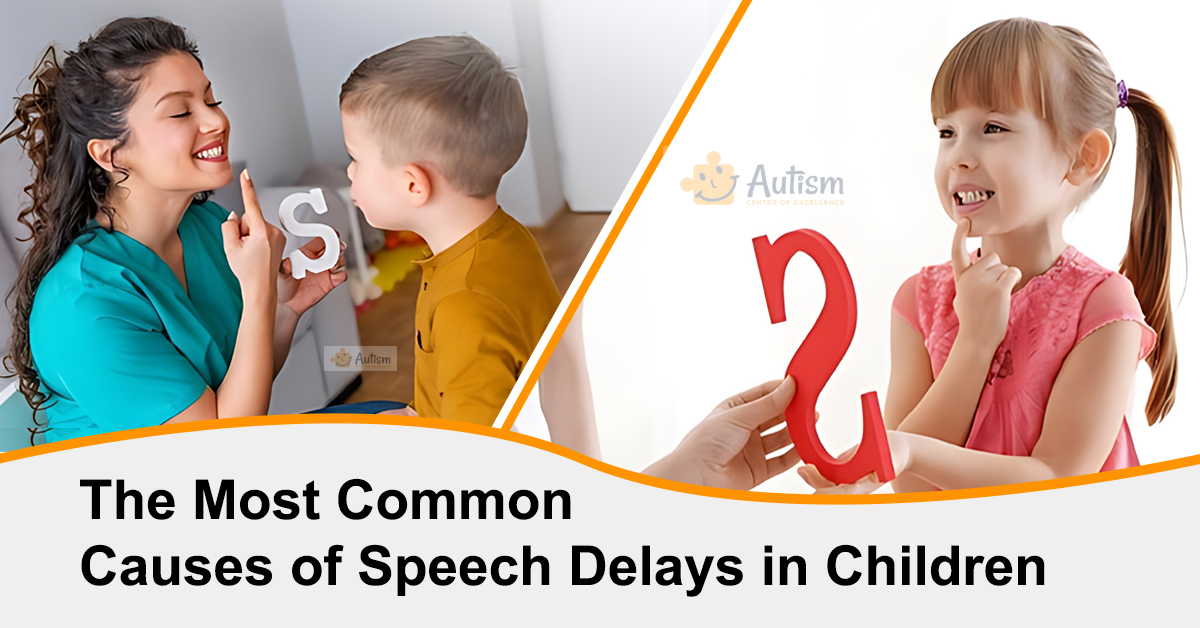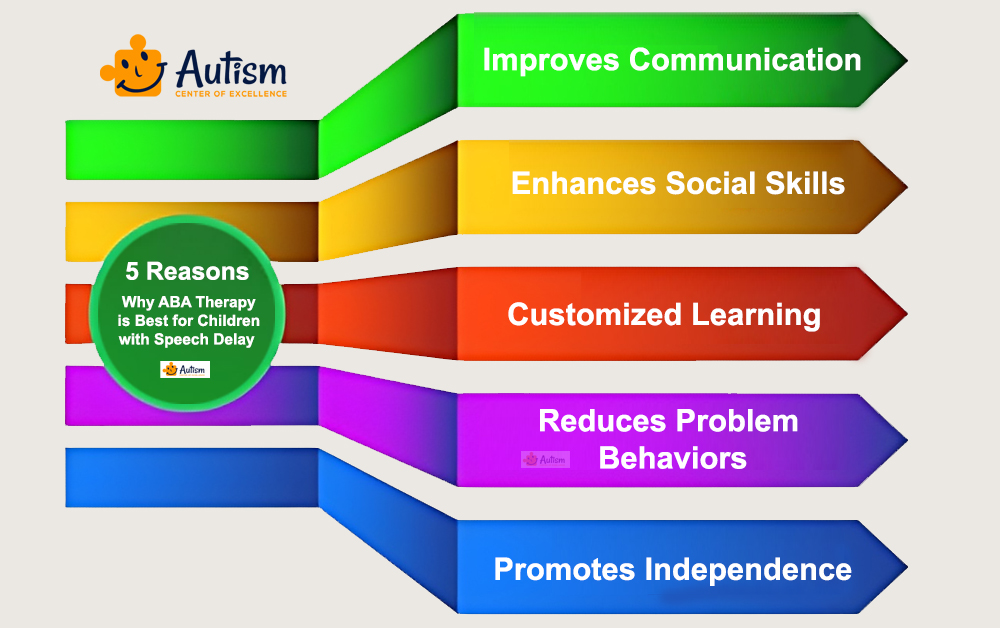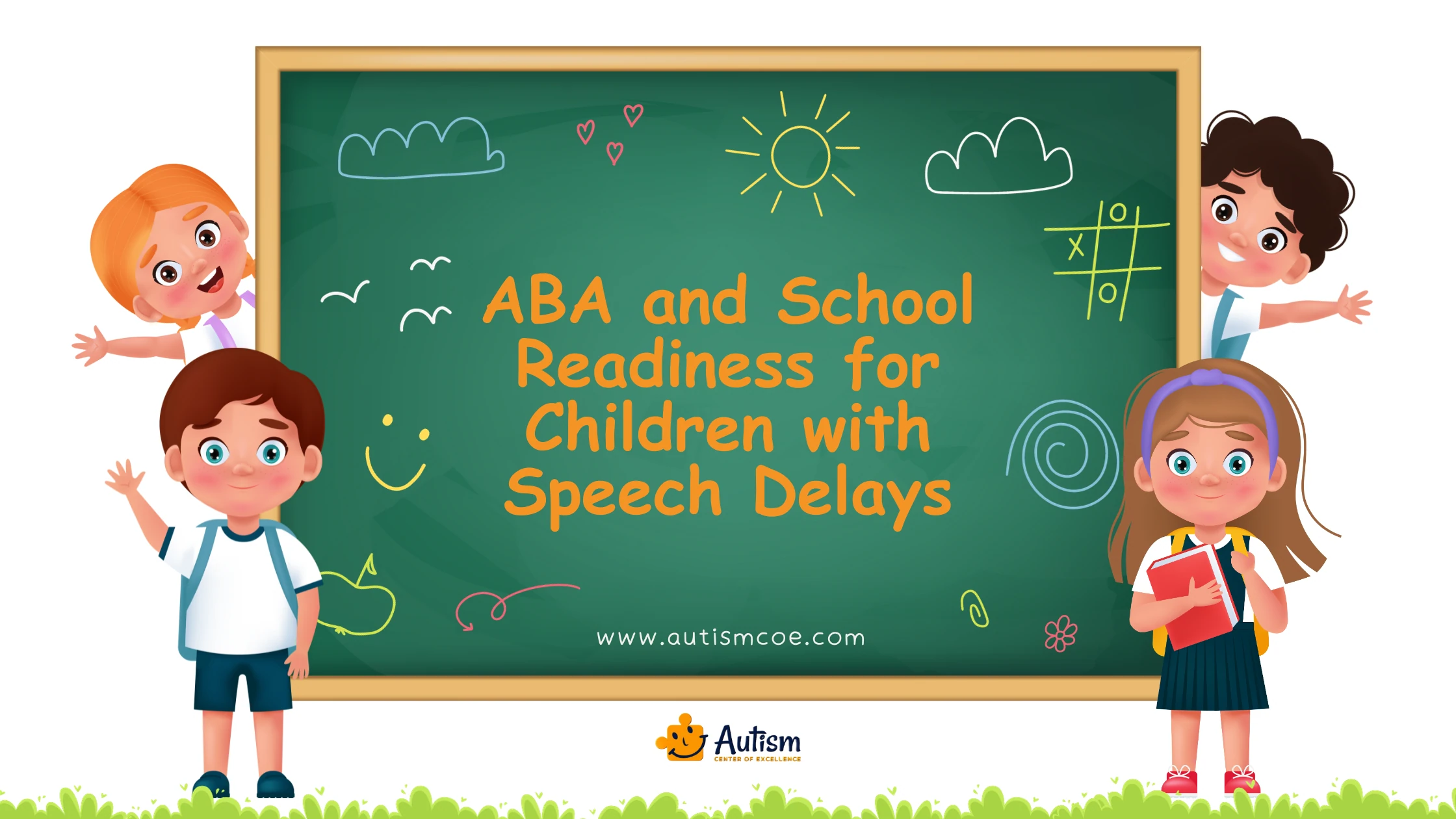“ABA is not just about addressing behavioral issues; it can play a crucial role in enhancing a child’s communication skills and overall school readiness.”
Whether ABA has been used previously or is currently being used, during the transition of speech-delayed children to school, it is the moment that ABA can have great power to make a difference. Applied Behavior Analysis is not about facing only behavioral concerns; it can even be the most reasonable tool that helps to build up communication skills and independence for children of everything in their world by school time. In this inclusive guide, we go through all the ways Applied Behavior Analysis (ABA) can help your child with speech delays, illustrating to parents, guardians, and educators why and how ABA is crucial to a highly successful educational journey.
Understanding Speech and Language Delay
Child speech and language development delay is when children struggle with speaking and understanding words for more than is considered for a certain age. It is when a baby is still not talking well and in a way that is equally expected of most babies. This lag in speech and language will result in a situation when they can not express themselves and understand what people are saying. We need to recognize the problems and address them to ensure that the child can meet the milestones and communicate in the desired way.

What is the Most Common Cause of Speech Delay?
Speech delays in children refer to many causes, which help provide the right support and intervention for the condition. Here are some common causes of speech delays in children:
👉 Developmental Factors: After all, the rest of the children may be slower to catch up with the same development of speech and language skills. Normal needs to be understood as a spectrum, considering that children develop differently and do not all necessarily reach the same milestones simultaneously.
👉 Hearing Impairments: Hearing issues that make children vulnerable to ear infections, hearing loss, or fluid in the ears, for example, will interfere with their speech development by detracting from their ability to hear and process sound.
👉 Oral-Motor Issues: For some kids, putting together the spoken language may be problematic because their organs (i.e., tongue, lips, and jaw) fail to coordinate. This may be due to oral apraxia or dysarthria, simply articulation disorders.
👉 Premature Birth: Babies who are born too early may have issues of speech and language delay because their organs are still immature and their nervous systems are not developed yet. Language impairment could be a consequence in these babies in the short term.
👉 Genetic Factors: Genetic factors can sometimes be responsible for language and speech setbacks. The genetic makeup of a family, having a language issue itself, may boost the risk of language problems in a child.
👉 Developmental Disorders: Typically, a speech delay may be a part of the condition and can be linked to autism spectrum disorder, Down syndrome, and also other developmental disorders. Speech Therapy involving children with such disorders will also have different protocols.
👉 Environmental Factors: A deprivation of language-rich environments deprives kids of the chance to discover speech. Where there are communication deficiencies or limited exposure to books and educational materials, children might have their early development hindered.
👉 Physical Health Issues: Long-term-occasion, affecting the rate of frequent illnesses and nutritional deficiencies, leads to an indirect decrease in speech development. The person becomes less eager and convincing as a result.
👉 Emotional or Psychological Factors: Emotional strain, trauma, or conditions affecting the child’s mental state also have the capacity to bend their communication skills. Origins of Language Like human beings, animals use sounds and gestures to communicate with each other. Unlike humans, they have not evolved to speak grammatically or semantically complex languages. However, their ways of communication vary between species. A young child may encounter language barriers, with the child experiencing trauma and anxiety, often failing to express themselves.
👉 Limited Social Interaction: Little time for socialization and play with other children prevents a society in nature and disrupts the language development of multilingual kids.
It is crucial to proceed with a comprehensive evaluation by a speech-language pathologist or Developmental Specialist after speech delays cause suspicion. “The intervention that is provided at the earliest of times must be imperative in the process of preventing the adverse results and achievement of the improved communication skills in the children.” The individual approach to dealing with speech delays will be determined by the primary trigger as well as the specific needs the child might have.
The Impact of Speech Delays on School Readiness
🧒 Speech Delays Can Impact a Child's Social Interactions.
Children may establish friends and develop vital social attributes in school. Child-centered education may offer various educational benefits. Communication difficulties can also occur when making friends and engaging in group activities if these children don’t handle these activities successfully. Such behaviors may lead to their isolation.
🧒 Speech Delays Can Hinder a Child's Academic Progress.
Practicing reading and writing requires a grammar base. If a little one cannot acquire speech and language skills properly, they may never be able to progress in scholarly areas like reading and writing.
🧒 Speech Delays Can Also Affect a Child's Ability to Develop Reading and Writing Skills.
Pronunciation delays may also not allow a child to acquire reading and writing skills. So, through early screening, parents and teachers all have to understand what consequences could be brought by such delays. An adequate standard of language and phonological consciousness is significant in reading progress, and the weakness in these key learning areas may inhibit a student’s success in renowned academic skills.
🧒 Children with Speech Delays may have Reduced Self-Confidence.
Kids experiencing speech problems usually are not able to express their thoughts, and because of that, they hesitate to show themselves in a group. This kind of conviction might limit their class participation, which will affect their attendance in the activities, discussions, and extracurricular activities, thus denying them a positive school experience.
🧒 Speech Delays Can Impede a Child's Ability to Communicate Effectively.
Students only have a few other options but to communicate in a non-verbal manner since schools are places where they have to listen, follow instructions, and express themselves. Children going through delays in speech may find it difficult to follow instructions, contribute to class discussion, or express their thoughts and needs to the teacher and other mates.
How to Prepare Your Children with Language-Delayed for School?
Providing a language-impaired student with a seamless transition into formal education is simultaneously intimidating and life-changing. It is, however, necessary in order to guarantee that the student can flourish at school. Here are some steps you can take to help your child prepare for school:
Early Intervention
For those who’ve not done it already, Early Intervention Services can be a good resource for speech abnormalities. Identifying these sticky points right from the beginning would make the difference between a well-prepared child and a poorly prepared child for school.
Consult with Professionals
Work with a speech-language pathologist, a pediatrician, and an educational professional to understand your child’s individual needs and the most effective ways of their speech development.
Create a Communication-Rich Environment
Accommodate a language-replete habitat for the home front. Read with the child, have conversations, and support the children’s expression. We can utilize visual supports, such as picture exchange systems and communication boards, to promote communication.
Routine and Consistency
Kids who are experiencing speech delay often thrive in having some routines and predictabilities. Align your routines about home life with your child to strengthen his feeling of home security and the understanding of the expectations.
Engage in Play-Based Learning
As time passes, many children play as a natural way to learn and develop communication and social skills. Children’s speech and language peaking come faster if they have the opportunity for pretend play and communicating with peers.
Advocate for Support at School
Keep communication lines open with teachers and other professionals about your child’s intellectual needs. Schools and therapists should work hand in hand in developing an Individualized Education Plan (IEP); if possible, a 504 plan might also be necessary.
Applying these guidelines, coupled with the help of the speech therapists, leaves you with a toolbox for preparing your child with speech delays to go to school and with the armory for excelling in the classmates.
Join Our Weekly Newsletters!
Subscribe now to stay updated with our latest email updates.
5 Reasons Why ABA Therapy is Best for Children with Speech Delay
The best therapy with remarkable outcomes in children with speech delay and a broad spectrum of developmental challenges is ABA (Applied Behavior Analysis). Here are the top 5 reasons why ABA Therapy for speech delay is often considered beneficial for children preparing for school:

1. ABA Improves Communication:
ABA assists early language-deficient children in functioning at the same level as others through effective communication skills. It shows them a way of showing themselves and understanding others better, which is limitless to them participating in class activities.
2. ABA Enhances Social Skills:
Additionally, ABA pays attention to social skills, giving people tools to communicate well in different settings such as schools and playgrounds. Fulfillment of this is significant in the context of friendship development and success at school work.
3. ABA Helps to Customized Learning:
ABA is customer-specific as the child receives one-on-one sessions targeting their requirements. The tailor-made approach toward every child enables the development of individualized strategies and interventions through which the child can learn at their ability and their own pace.
4. ABA Reduces Problem Behaviors:
ABA could enable one to set behaviors that need to be addressed for disruptions in learning. Teaching a different approach and stress management helps create a more adaptable and conducive learning environment.
5. ABA Promotes Independence:
ABA is one of the most realistic methods for children to become self-sufficient. This is an extremely important aspect, and it allows responding to the tasks and the challenges that come their way on their own.
ABA is an effective tool for getting children unable to read and speak ready for school majorly because it enables children to become good communicators and independent and helps identify and deal with problem behaviors through a customized approach.
Overcoming Speech Challenges: ABA Strategies for School Success
ABA strategies become very important for children with speech difficulties, as those with speech problems are likely to have myriad challenges and difficulties in relation to communication and learning in a school setting. ABA is an empirically founded and evidence-based intervention mode that focuses on reducing and increasing specific behaviors and developing current and future skills. Here are some ABA strategies that can support children with speech challenges in their academic journey:
👨⚕️ Functional Communication Training
ABA therapists might determine what particular function a kid’s difficult behaviors are fulfilling alongside knowing why the child’s behavior. Therapists can also demonstrate all the right channels to voice their needs and concerns to reduce frustration and minimize speech development problems.
👨⚕️ Visual Supports
Visual aids, like visual schedules, communication boards, and picture systems, aid in ABA therapy. This visual aid can give children an alternative way of expressing themselves, and cognitive literacy may be achieved by extending the learning of routines and expectations.
👨⚕️ Positive Reinforcement
ABA utilizes Positive Reinforcement as the guiding principle to help instill and keep appropriate behaviors, with speech being an example. Therefore, Positive Reinforcement plays a major role in the educational program of an autistic child. The benefit of speech is that children are rewarded differently with praise, reinforcement, or other rewards, which persuades them to use speech further for communication enhancement.
👨⚕️ Self-Monitoring
Communicating ability becomes a part of a child’s habits from the beginning. The strategy can make them more cautious and get to know their communication abilities, and they can also make changes as needed.
👨⚕️ Family Involvement
Families are usually involved in ABA therapy. Parents and caregivers are taught to use ABA methods at home, where they will support their children outside the therapy sessions. As a result, the child will keep the skills they have been learning in sessions even when they go to other places.
ABA techniques are very effective for children with speech problems in school and make a wonderful progression at work. Through offering coordinated, individualized, and information-based programs, ABA therapy enables children to learn these skills, such as talking, playing in class, and maintaining good social networks, which are all the set foundations for academic success.
Frequently Asked Questions & Answer
How can Early Intervention Benefit Children with Speech Delays?
Adequate care for speech delays in children is highly important right from an early age. This makes communication skills especially strong, helps with academic success, helps individuals who are emotionally distressed and leads to social integration. Considering its causes, it creates the fundamentals for general development and a child’s prospects as an adult.
What are Some Strategies to Prepare a Child with Speech Delays for School?
As a parent of a child whose speech was affected, sustain speech therapy, pull along with the child’s daily home language practice, ensure play dates are frequently scheduled, make use of visual aids where they are necessary, teach any alternative communication method like sign language if there is a need, and collaborate with the school on developing an individualized education plan (IEP) that suits the learner’s needs.
Why is ABA Therapy Considered Beneficial for Children with Speech Delays?
ABA, which means Applied Behavior Analysis therapy, is well known to provide significant benefits to speech-impeded kids through its systematic and research-proven methods. It aids in discovering and treating the latent factors due to speech delays using data-driven techniques. ABA promotes verbal skills, handles in a non-threatening way, and integrates social engagement, the knowledge of which is key for children with slow speech development. While its flexibility is unique, it excels in providing individualized techniques that meet each child’s needs, making it an important asset in speech therapy and child development.
How does ABA Therapy Address Problem Behaviors in Children with Speech Delays?
ABA therapy helps kids with speech issues by applying certain noticeable methods. It finds and describes behavior patterns and their reasons and then develops customized interventions for each. With rewarding systems and methodology, ABA teaches the essence of where more adapted and proper responses can be found, enhancing conversation and making life less stressful. This intervention is realistic because it effectively introduces new skills and decreases challenging behavior through steps of complexity, thus making learning more desirable.
Conclusion
The final word should be that the ABA applied behavior analysis is one of the most prominent and effective approaches to kids with speech delays preparations for schooling. ABA does not only treat behavioral problems but also imparts a lot of skills that children need, for instance, academic ability and social skills.
Identifying agents of speech delays, observing early support, and observing an at-home environment could be considered the first steps in the child’s journey with this issue. ABA treatment goes along with very specific methods of dealing with speech disorders to help children have better communication as well as social skills and independence.
A combined approach of speech therapy, speech therapy through books and movies, professional guidance, and parent leadership will help a child with speech delays get smoothly on a joyful and successful educational path.
Please Note: The content of this blog is for informational purposes only and should not be considered a substitute for professional medical advice, diagnosis, or treatment. Consult a qualified healthcare professional for personalized guidance tailored to your specific situation.

Bhavika Bhasin
Bhavika Bhasin is the Research and Marketing officer at AutismCOE. She works with children and adults with ASD. Her clinical research includes evaluating various available autism screening and diagnosis methods and their efficacy. She is currently developing a novel screening exam that is indicated to be more accurate than the existing available exams. She is also writes articles papers for various publications.


